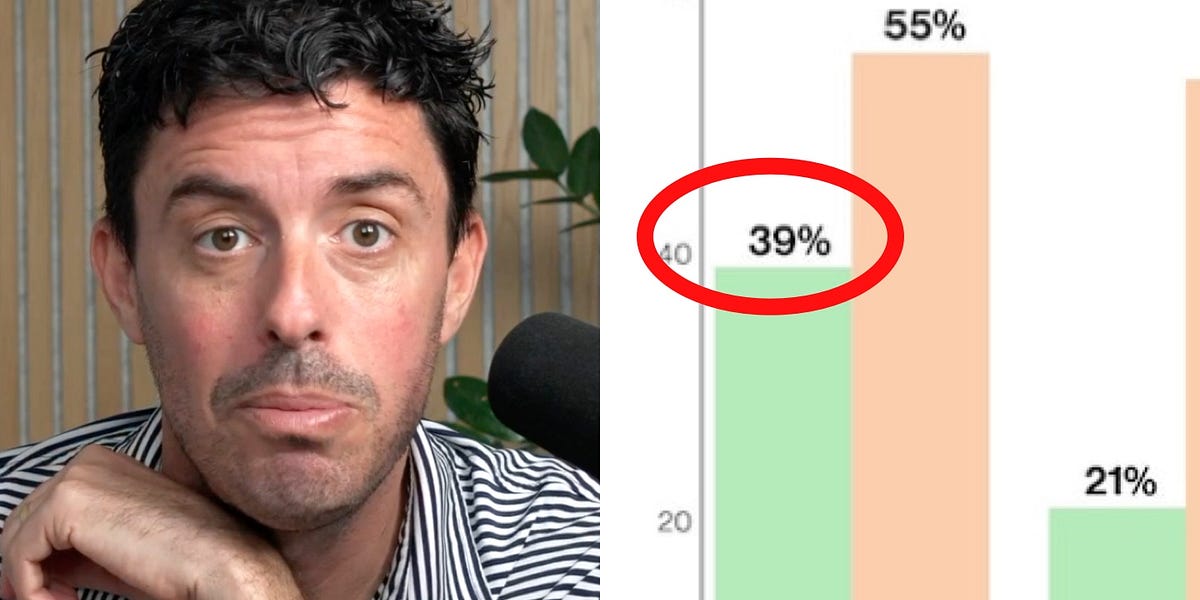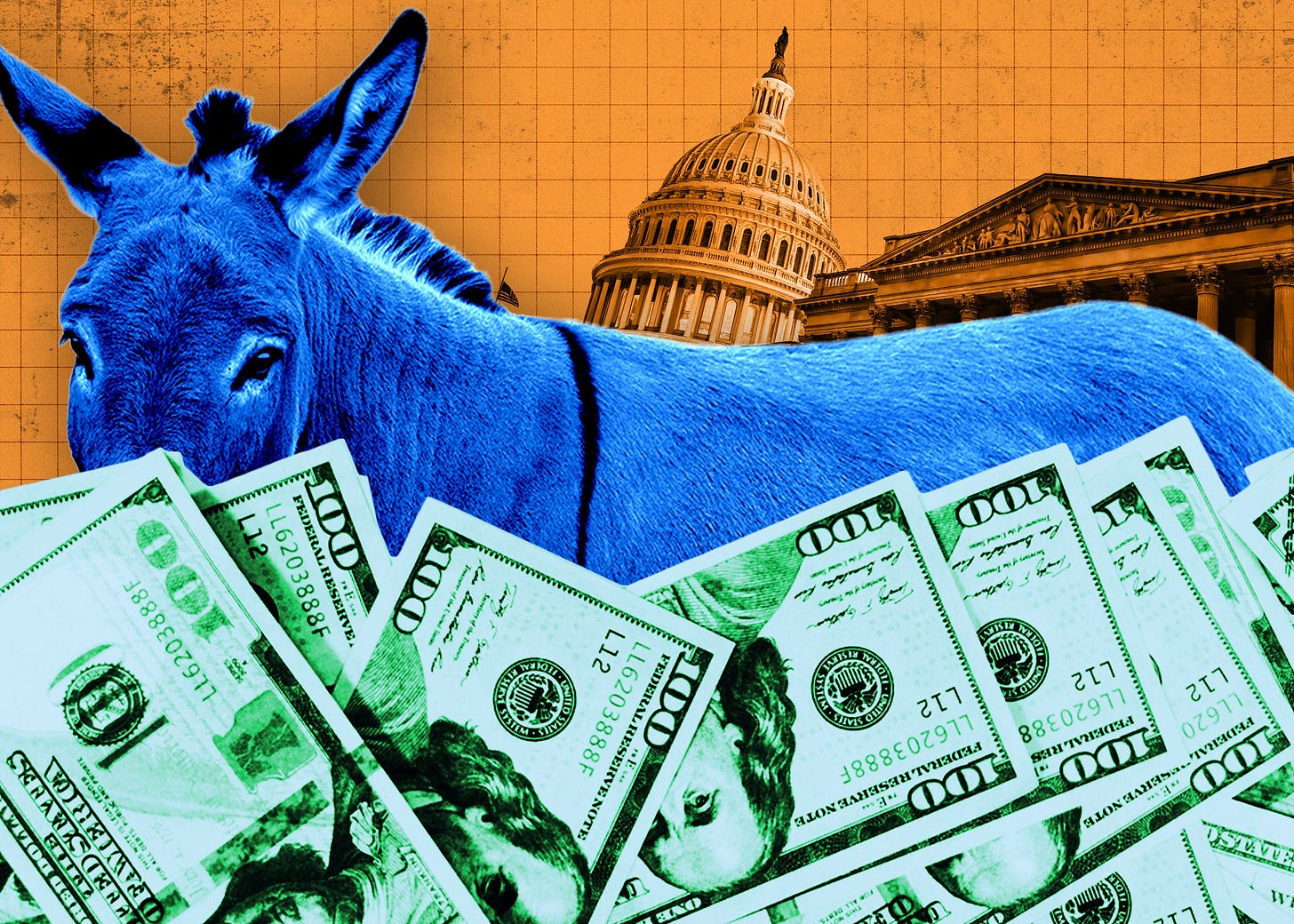
The Unexpected Pope
April 27, 2025
Trump Polling Is a Disaster at 100-Day Mark
April 27, 2025AFTER THE NOVEMBER ELECTION, Democrats had no shortage of things to panic over—including DOGE, the rise of anti-vaccine skepticism, and an aggressive deportation regime targeting immigrants.
But for the political-operative class, it was a specific, tactical matter that was causing a unique kind of stress. In their circles, it was taken as a fait accompli that Donald Trump, with his penchant for political vengeance, would move to dismantle a critical piece of their party infrastructure: the online giving platform ActBlue.
On Sunday, Trump did just that, using a social media post to instruct “authorities” to investigate ActBlue for unsubstantiated allegations that it allowed foreign contributions to find their way to Democratic campaigns. He vaguely suggested that officials at the company “should all be in jail.”
It was the most direct threat to date issued by the president against ActBlue—and, for those already panicky operatives, the surest sign yet that he will move to dismantle the platform, which is used by just about every Democratic campaign to process and collect online donations.
“The party needs to be prepared for an alternative were there to be a long, dragged-out lawsuit or if it were shut down, even if in the short term,” warned Rufus Gifford, who served as the campaign finance chair for the Biden-turned-Harris presidential campaign. “We have to put all the options on the table, because that engine needs to continue to exist.”
ActBlue has been one of the greatest success stories in modern politics, revolutionizing the way money is raised and helping to lift up candidates for everything from school boards to Congress. It has been such a goliath that Republicans went from trying to copy it to trying to kill it. Recently, the GOP has claimed with little evidence that foreign money can easily (and illegally) be laundered through the platform and influence American elections.
The threat to ActBlue became so acute during the 2024 campaign that Democratic operatives who specialize in digital fundraising privately began talking with clients about developing contingency plans. They urged candidates and advocacy groups to set up backup options for processing payments and donations—such as NGP VAN and GoodChange—or by simply building their own donation platform via Stripe.
In recent months, different consultant groups have been charting out what their own individual portals could look like and debating whether the party’s formal campaign committees could, in theory, house one of their own (the consensus was that it would pose an ethical dilemma for, say, the Democratic National Committee to run a portal where primary challengers raised money for campaigns against incumbents). Recently, digital operatives have begun testing fallback options, which have proven fairly successful in replicating ActBlue’s conversion rates (the percentage of people who make a donation after receiving a solicitation).
Last Thursday evening, those discussions took on a different dimension when the president signed a memorandum aimed at investigating ActBlue for possible illegal donations. He directed the Justice Department to conduct the investigation and report its findings within 180 days. It was a clear escalation in the Republican party’s effort to destroy the Democrats’ ability to fundraise.
But instead of ditching the fundraising platform, or putting into action the plans to build alternatives to it, Democrats are, for now, rallying behind ActBlue.
Strategists who spoke with The Bulwark said that while they feel that they can ultimately stand up those fallback options in the 180-day window, they believe bigger considerations are currently at play than the more technical concern of how to best raise money online.
After watching universities and law firms give in to Trump’s threats, the party felt it had little choice but to rally behind ActBlue, convinced that accommodation for the sake of putting off a fight ultimately does little good.
“If he’s successful in disrupting ActBlue, or hurting ActBlue, or causing chaos in the Democratic party—what’s to stop them from coming up with some bullshit reason to go after another vendor?,” said Mike Nellis, a Democratic consultant and the founder of the digital agency Authentic. “It’s important for Democrats to stop and say, ‘This is not okay, this is not normal, and we’re not going to allow it to happen.’”
Following Trump’s executive order, Democratic candidates sent out a flurry of fundraising emails last week attempting to raise money off the targeting of ActBlue. In an email from the Democratic National Committee, chairman Ken Martin wrote that the move was a “blatant power grab designed to undermine democratic participation” and said Trump was “panicking” amid his softening approval ratings. “Now, we’re asking for your support right now to help us send a message: Democratic donors aren’t going anywhere,” Martin added, directing people to click on links to ActBlue’s donation landing page.
The messages seem to be working. According to Ryan Murphy’s ActBlue tracker, Thursday was ActBlue’s highest-performing day in three weeks. And donations to Democratic candidates and groups increased by nearly 50 percent on Thursday from the day before.
MANY DEMOCRATIC STRATEGISTS told The Bulwark that they were relieved to see the reaction among the committees and donors to Trump targeting ActBlue. They also said they were somewhat comforted that Trump had instructed the Justice Department only to investigate ActBlue rather than shut it down outright.
In a statement, ActBlue said it would “pursue all legal avenues to protect and defend itself against the Administration’s baseless claims,” adding that the Democratic party should “unite and create a blue wall against the oppressive use of power by this White House and their accomplices in Congress.”
But no one appears to think that this standoff will end without some dramatic confrontation or action. Nor do they regard Trump as the only threat. House Republicans launched an investigation into the firm’s security practices last year, and they have made repeated demands for information about its operations. Rep. Bryan Steil (R-Wis.), chairman of the House Committee on Administration, subpoenaed ActBlue for documents in October that dealt with how it verifies donors and how it ensures that foreign actors do not “use the platform to launder illicit money into U.S. political campaigns.”
Democrats’ instinct to rally around ActBlue might be in part due to their belief that they must stand up to Trump, but it also betrays the fact that they do not currently have a good alternative that can service the party and its grassroots army as efficiently. ActBlue was founded in 2004, and it has been the backbone of the Democratic grassroots fundraising operation for years.
But even as the party defends ActBlue, some digital strategists view the moment as an opportunity to develop better fundraising tools and new ways of reaching online donors. Tim Tagaris, the digital fundraising director for Bernie Sanders’s 2016 presidential campaign, predicted this week that Trump’s attacks on ActBlue will “unleash a torrent of short-term fundraising and long-term innovation that Republicans will come to regret.”
Others want to use the current moment as an inflection point in which they can purge the online fundraising community of some of the party’s worst actors. Democratic strategist Murshed Zaheed said there’s ample evidence that people are tired of “grifty” fundraising text message appeals or corny emails asking for money, and there hadn’t been any game-changing innovation in the world of online fundraising in decades.
“It’s a big opportunity to block and build. You stay calm, you defend, the law is on your side, and ActBlue will stay strong and hum on. But at the same time, Democrats and progressives should be thinking about new techniques, new technologies, and how they can diversify their infrastructure,” he said. “It’s never a good idea to put all your eggs in one basket.”
— DNC chair Ken Martin announced this week a renewed effort to build up state parties. He said the DNC will increase the amount of money the committee gives state parties in red states by 50 percent and in blue states by 30 percent, which will allow parties to hire new staffers and open up more offices. Martin told The Bulwark last month that the party has historically been particularly bad at playing the long game. But with the 2030 census changes almost certainly shifting more political power to the southeast, Martin warned that Democrats could not be “caught flat-footed as a party” when that happens. The initiative is the first major investment he’s undertaken as party chair.
— Speaking of Martin, the fallout from David Hogg’s decision to get involved in congressional primaries has not stopped. Martin made it crystal clear this week that he does not think it’s appropriate for Hogg to raise money to target incumbent Democrats given his position as a DNC vice chair. “No DNC officer should ever attempt to influence the outcome of a primary,” Martin said on a press call with reporters. He added that Hogg was “more than free” to get involved in primaries, but not as a DNC official.
Hogg could very soon be forced to pick whether to continue with his primary project or hang on to his seat as vice chair. NOTUS reported this week that Martin planned to propose an update to the DNC’s rules mandating that DNC officers stay neutral in all primaries (not just the presidential). DNC members would vote on the proposal at their August meeting.
— Some Georgia Democrats want Stacey Abrams to move on.
— A Democratic state senator in Florida says the state party is “dead.”
— Another Hasan Piker profile.
Great Job Lauren Egan & the Team @ The Bulwark Source link for sharing this story.





